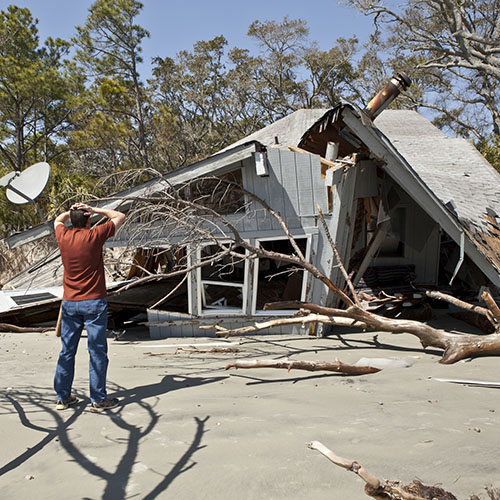Proven Ways Burglars Case a House and 5 Ways to Prevent It

What does casing a house mean?
Burglars will sometimes watch a home for a length of time to determine patterns and choose precisely the right time to carry out a burglary. You can look out for common tricks of the trade to prevent a break-in from occurring. We've compiled the most common tactics used by burglars to help ensure that you are not the next victim of a home invasion.
Houses that are easy targets often have similar characteristics: high fences or vegetation, no security system and (most importantly) an open front door. Burglars looking to rob a home prefer houses that offer protection from being seen by the naked eye. If they thought an alarm would sound and notify you of their presence, they'd be less inclined to break into your home over your next door neighbor's. Meanwhile, leaving your front door unlocked is basically an open invitation for strangers to walk in and take whatever they like without you even noticing!
In the mind of a burglar, there is really only one goal: get in and out quickly with the most valuable items. Those items can include cash, jewelry, prescription drugs, electronics or anything else that may pique their interest while inside. Anything that looks like it has value to them is fair game. Burglars may be even more inclined to choose your home if your prized possessions are on display for the average passerby to see — such as a huge flat screen TV visible through your front window, or a brand-new sports car sitting outside in the driveway. Once a potential thief sees what the houses within a neighborhood have to offer, they may leave some kind of indicator (like a flyer or a sign on your door) to keep your home on their radar as vulnerable.
Can I protect my home from a burglar?
Now is about the time people typically wonder: How can I discourage a burglar from casing my home? There are plenty of preventative measures that can be taken to ensure that you are not the next victim of a break-in. Based on previous victims' experiences and expert studies, here are some examples of how you can keep yourself and your belongings safe from a burglar.
The first defense to prevent a stranger from gaining access into your home? Making sure all doors and windows are closed and locked. Burglars have shared that they have often walked up to a home and walked right inside because the front door was open. Leaving windows unlocked is also an easy way to get in — even on the second floor! Just because you don't think it's accessible to climb, does not necessarily mean that a burglar won't find a way up there and slide in. Having a deadbolt on your door is the most foolproof method to keeping intruders out as many other locks can be disabled simply by using a credit card.
Even though most burglaries typically occur during the daytime, motion-activated lights are another option to keep burglars from attempting to break-in, fooling them into thinking you've woken up based on their movements around the house. Having a well-lit home can also give you a better chance at detecting unwelcome company before they make any sort of advancement towards your property.
No one wants their home to look vacant while they are away on a vacation. Many people believe that leaving the lights or TV on while they are away will make it seem as though the house isn't empty. However, in quiet neighborhoods, this is a tell-tale sign that a house is actually empty, since it can stand out from the surrounding homes. If a burglar has been scoping you out, they will take this as confirmation that no one will be home to stop them from breaking in. Instead of leaving the lights on entirely, an alternate suggestion is to set timers for the television, radio or lights to make it seem like they are being turned on and off naturally.
Although a large, scary dog is commonly regarded as the best way to prevent someone from breaking-in, remember that animals may not always perceive strangers as dangerous. Instead of realizing they should be scaring the thief away, the dog may be fooled by a burglar who offers it a treat, or may nuzzle up to them for a cuddle session. If having a dog is important to your protection, consider a breed that barks — a lot. Burglars have noted that a small dog making a lot of noise is more of a deterrent to breaking-in than a large, intimidating dog. A loud dog's constant barking could also alert your neighbors that something is wrong and they may call the police.
If a burglar is able to gain access to your home, the first place they usually go is the master bedroom. Jewelry left out on a dresser or on display in a case is easy to snatch and can be exchanged for a hefty payout. Keeping valuable gold and silver in a more hidden place may make getting ready for a night out more inconvenient, but taking this tiny step can result in a burglar walking away with much less than they might have otherwise been able to.
The last thing a burglar wants to see when casing a house is a clear view of your home from the street or a neighbor's porch. If they are going to be breaking-in, they will want a high fence or tall vegetation to keep them hidden from those who might be keeping an eye on your home. Having the privacy is surely nice, but keep in mind that protection from spying eyes is a much sought after detail for thieves. Try to keep vegetation surrounding your home trimmed to a height that wouldn’t allow a burglar to remain hidden for long.
Finally, having a security system, especially one with security cameras, is one of the simplest ways to protect your residence from a break-in. If a burglar sees that the house is protected by some sort of an alarm system, they are usually less likely to attempt to break in. However, some may think the sticker on your window is a ploy and no longer think twice about the threat of an alarm going off. In cases such as those, a security camera installed near the entrance (or entrances) of your home allows you to later identify the burglar by photo caught on surveillance. It is also useful if a burglar is disguised as a utility worker or solicitor trying to scam their way into your home; you can view who is at the door through the camera and choose not to afford them entry.
My home has been broken into — now what?
In the instance that you do believe a burglar is casing your home, there are several steps you can take. First, ensure that you have followed all of the above safety precautions and home security tips to make it even more difficult for the burglar to gain entry into your house. Next, notify the local police who may be able to patrol the neighborhood and be on the lookout for any suspicious activity around your home. Lastly, have a plan in place on what to do and who to call if you are home during an attempted robbery.
Should a break-in occur when you are not home, take the necessary steps to notify the police to launch an investigation. Perhaps your neighbors were able to get a glimpse of the suspect and can pass a description along to police officers. If you didn't already have a security system in place, be sure to install one as it is not uncommon for burglars to return to a home that they have recently robbed.
When a break-in occurs, it takes time to regain the feeling of safety you felt in your own home. However, hopefully these suggestions can offer you peace of mind in knowing that you are much less likely to be the victim of a burglary. Home security may be overlooked as non-essential, until your home is the one that is targeted.
Resources:
https://www.architecturaldigest.com/story/what-burglars-look-for
https://www.safewise.com/blog/6-things-unknowingly-welcome-burglar
https://simplisafe.com/blog/burglar-reveals-15-trade-secrets-look-mind-burglar
https://www.creditdonkey.com/why-burglars.html
https://blog.cammy.com/burglar-confessions



